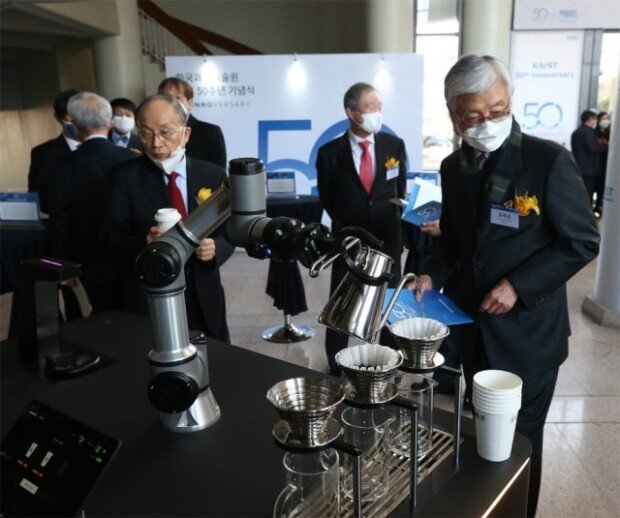KAIST celebrates its 50th anniversary
KAIST celebrates its 50th anniversary
Posted February. 17, 2021 07:35,
Updated February. 17, 2021 07:35

Korea Advanced Institute of Science and Technology (KAIST), which started as Korea’s first research-oriented science and engineering institution, celebrated its 50th anniversary on Feb. 16. The institute that was founded by a loan from the U.S. has grown into a university that exports educational models to foreign countries, such as Kenya, only in half a century.
A ceremony held under the theme, “Fifty years that brightened Korea, 100 years that will brighten the mankind” took place at the university’s Daejeon campus and was broadcast on its YouTube channel. There was a demonstration of a robot barista and a self-driving robot developed by the school’s graduates and artificial intelligence (AI) piano performance prior to the ceremony. President Moon Jae-in and World Economic Forum Executive Chairman Klaus Schwab sent their congratulatory remarks.
KAIST was founded on Feb. 16, 1971 as the Korean Academy of Sciences (KAIS) in the Seoul Research Development Complex and moved to the Daedeok Science Town in Daejeon in 1989 to start as a university offering undergraduate and graduate programs. In 2009, KAIST acquired Information and Communications University (ICU) to strengthen the information and technology field.
The school has produced a total of 69,388 graduates, including 14,418 doctors, 35,513 masters, and 19,457 undergraduates in the last half century. These graduates account for 25% of the doctoral personnel in global semiconductor companies, such as Samsung Electronics and SK Hynix, and about 20% of professors at domestic engineering colleges. KIAST has left a footprint in the history of science and technology by building the first Internet system in Asia and the Pacific region, establishing the first AI research center in Korea, and successfully launching Korea’s first artificial satellite Wooribyeol 1. KAIST was ranked 39th in QS World University Rankings in 2020.
Myung-Hun Jee mhjee@donga.com
Headline News
- Joint investigation headquarters asks Yoon to appear at the investigation office
- KDIC colonel: Cable ties and hoods to control NEC staff were prepared
- Results of real estate development diverged by accessibility to Gangnam
- New budget proposal reflecting Trump’s demand rejected
- Son Heung-min scores winning corner kick







